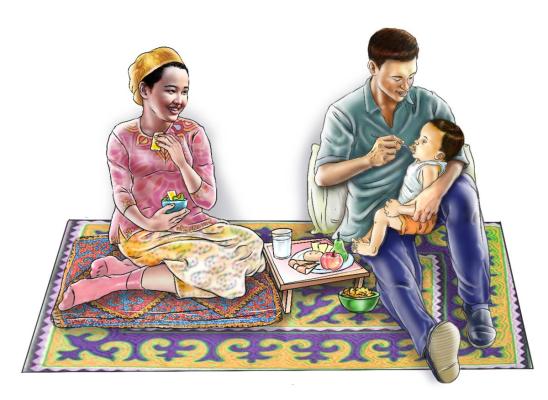The Feeding and Disability Resource Bank is a repository of materials that help nutrition and disability program managers, government leaders, and donor agency staff design and implement effective nutrition programs for children with disabilities. According to the United Nations Convention on the Rights of Persons with Disabilities (CRPD), children with disabilities include those with, “long-term physical, mental, intellectual, or sensory impairments, and who may experience barriers that may hinder their full and effective participation in society on an equal basis with others."
This resource bank includes manuals, job aids, training curricula, and assessment tools as well as research articles that provide programmatic tools. All selected resources are easy to read and understand, free to access, not subject to copyright restrictions, and relevant to one of the following five thematic sections of the Resource Bank:
- Identifying Feeding Difficulties
- Managing Feeding Difficulties
- Identifying Disabilities
- Supporting Children with Disabilities and Their Families
- Promoting Disability Inclusion
Click on any of the five sections in the Resource Bank for further information on that section along with links to relevant resources. If a resource is relevant to more than one section, it will be accessible through all applicable sections. You can also use the filters in the search function to target your search.
Nearly 240 million children worldwide live with a disability, the majority of them in low- and middle-income countries with limited to no access to the support and services they need. Up to 80 percent of children with disabilities, and up to 45 percent of children without disabilities, experience feeding difficulties, such as difficulty chewing or swallowing. Feeding difficulties can occur in any child for any length of time and can be part of a larger disability or an isolated challenge. In both cases, the feeding difficulties can impact the child's health, development, quality of life, and limit opportunities to connect with families and social groups as sharing a meal with others is a way of connecting with people, communities, and cultures. The causes of these difficulties are complex and programs must offer a range of universal and targeted supports and services.
The CRPD and the Convention on the Rights of the Child (CRC) highlight that both children with and without disabilities have the same rights, including the right to access healthy food and adequate nutrition, to receive essential nutrition services, and to reach their highest attainable standard of health. However, social, institutional, economic, and political barriers often prevent children with disabilities from attaining that standard
- Nutrition and disability program leaders who influence the design and implementation of programs and services for children with feeding difficulties or disabilities and their families,
- Government and donor agency staff who influence the design of programs and policies, and
- Members of organizations and program leaders working to strengthen the design and implementation of programs and services for all children.
Resource Bank Sections
Identifying Feeding Difficulties
Screening for and identifying feeding difficulties at the appropriate developmental stages is critical to providing support and early intervention for children and their families. This section provides an overview of practical approaches, tools, and trainings to identify feeding difficulties in children, both in clinical and public health settings. Read more ›
Managing Feeding Difficulties
Providing children and families with support, information, and resources is crucial after the identification of feeding difficulties. This section offers resources that aim to improve services and support for children experiencing feeding difficulties. Read more ›
Identifying Disabilities
Early identification of disabilities is necessary to ensure that all children have the resources and interventions they need to develop and thrive. This section provides an overview of practical approaches, tools, and trainings to identify disabilities in children. Read more ›
Supporting Children with Disabilities and Their Families
Identifying disabilities in children has little meaning unless it is linked to providing the support children and their families need to succeed. This section contains resources relevant to supporting children with disabilities and their families. Read more ›
Promoting Disability Inclusion
Including disability in nutrition policies and practices is fundamental to supporting the highest possible quality of life for children with disabilities and their families. This section contains resources to raise awareness about and promote disability inclusion in programs and communities. Read more ›



